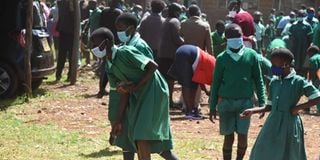Premium
Missing Meru underage learners ‘are married or in businesses’

Pupils in school during break.
Two months after schools were shut in March, Grace Kananu*, a Kenya Certificate of Primary Education (KCPE) candidate, met a 21-year-old man who convinced her she was ripe for marriage.
Since she used to sleep alone in a separate house from her mother, she would invite her boyfriend for an overnight stay.
“When I got pregnant I had to disclose to my mother what had been going on. I moved in with him but I was not forced,” she said during an interview at her boyfriend's home in Lailuba Village, Tigania East, Meru County.
While Kananu initially claimed to be 18, after further questioning, she said she was 17.
But still, records at a primary school where she had been sponsored by The Village Trust (TVT), a local organisation that sponsors needy children, show that Kananu was born in 2005. That makes her 15.
Now six months pregnant and living with a man who also did not go to secondary school, Kananu is staring at a bleak future after her dream of becoming a high school teacher was shattered.
Tall order
Although she is determined to sit her exams and proceed to high school with TVT executive officer Doreen Kendi saying they would continue sponsoring her, this could be a tall order given her new responsibility as an underage wife and a soon-to-be-mother.
This is the predicament that faces hundreds of candidates in Meru County who have dropped out of school due to the Covid-19 pandemic.
According to Education ministry official data, 303 Class Eight girls in Meru County did not report to school after the partial reopening and are reported to be either pregnant or married.
Another 510 Kenya Certificate of Secondary Education (KCSE) candidates are also reported to be pregnant or married as 610 Form Four boys engage in small businesses, including boda-boda, the data reveals.
In total, 1,066 Class Eight and 1,303 Form Four girls did not report to school in Meru County after the partial reopening. For boys, 990 and 832 Form Four and Class Eight candidates respectively have not reported.
The data analysed reasons for not reporting to school under four categories: pregnancy/marriage; parents’ relocation, truancy and “others”.
Miraa trade
Under “truancy”, students failed to report because they simply did not feel like or after engaging in small businesses such as boda-boda and miraa where young boys are employed to harvest the stimulant.
At least 610 KCSE boys and 579 girls are in this category, which also lists 504 boys and 528 girls in Class Eight in the county.
Educationists are also worried that there is a trend in which some boys and girls under the age of 18 decided to get married, with the most affected areas identified as Igembe North, Igembe South, Igembe Central and Tigania East sub-counties.
In Igembe South, for instance, 110 Class Eight girls either got married or fell pregnant while 87 boys were reported to have married.
According to the Meru county director of Education Milton Nzioka, the situation was so worrying that they had mobilised all stakeholders to try and convince some of the learners to go back to school.
“We are talking to them to see if they will change their minds because, after dropping out of school children get into many problems,” Mr Nzioka said in a phone interview.
“But we are also getting challenges with some parents who don’t have the right attitude on education. They seem disinterested with the education of their children,” he added.
Meru county education board chairman Prof George Muthaa said some of the girls who did not report to school have also ventured into grocery businesses, introducing them to the club of “mama mbogas”.
Cultural factors
“There are also cultural factors, including circumcision for Class Eight boys. Engaging in the consumption of drugs and lack of interest by parents is also to blame,” said Prof Muthaa, who is also the Dean, Faculty of Education at Chuka University.
Prof Muthaa warned that the problem is a ticking time bomb that will soon explode if measures are not taken to remedy the situation.
He said that in areas such as Tigania, young girls are allowed to sleep in separate houses from their parents', exposing them to temptation as happened in Kananu’s case.
“But the marriages these young boys and girls have engaged in will not last. They are just cohabitating and, when reality sets in, they will separate, which will present a bigger problem to the society. We also need to address the problem of the boy-child if we are to solve this problem,” he said.





